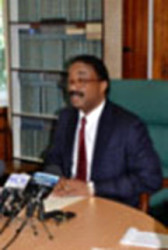Attorney General Basil Williams led a delegation to a recently held oil and gas workshop in Barbados and among the issues discussed were overlapping oil claims and maritime zones.
Speaking to reporters at a press conference yesterday he said that the workshop fell under the Improved Access to Justice in the Caribbean (IMPACT Justice) Project which is funded by the Canadian Government and executed by the Cave Hill campus of the University of the West Indies.
He noted that Professor Velma Newton who is at the helm of the programme had visited Guyana previously and held a continuing legal education seminar.

According to Williams the workshop was timely as it dealt with the question of delimiting and overlapping claims and overlapping maritime zones. “All of this will be relevant in terms of our situation in Guyana on either side of our borders with Venezuela and Suriname”, he said, adding that the law that applies to these situations was discussed during the workshop.
He said that the question of international petroleum contracts particularly the vital terms and conditions for such contracts, the nature and types of such contracts as well as health, safety and the environment, dispute resolution clauses and arbitration clauses were also topics of discussion by the representatives of Caricom countries who were in attendance.
Williams stated that while at the workshop he learnt that in addition to Trinidad, Barbados has an oil industry and other countries are in the process of doing exploration. “As you know we are on the verge, hopefully of exploiting the oil find that was discovered in the Stabroek Bloc”, he noted.
Asked how the workshop clarified the issue of overlapping maritime boundaries, he said that where countries have adjacent coasts and are on opposite sides, the demarcation would arise where there are overlapping claims or zones. He said that while this can be fixed by agreement, the standard employed can be by determining a line of equidistance. He said that even though this line it is not a law, it is one that is deployed generally in doing such demarcations. He said that if it is done by consent it can be done through compulsory adjudication under the provisions of the Law of the Sea convention.
Asked how the controversy with Venezuela can be dealt with when that country is not a signatory to the Law of the Sea Convention, Williams said that despite this, “it was basically international law practice and customs…where you have overlapping oil claims there is a duty on both countries to cooperate and collaborate in the exploitation of such resources”.
For months, Venezuela has laid claim to a large section of Guyana’s maritime space inclusive of the area where a significant oil find was made earlier this year. Weeks ago tension began to rise with Venezuelan troops being mobilized near the Guyana/Venezuela border and armed Venezuelan boats traversing the Cuyuni River which is within Guyana’s territory. The troops were withdrawn following a meeting between the Presidents of Guyana and Venezuela and the UN Secretary General Ban Ki-moon in New York.
Williams said too that during the workshop he posited that the question of the overlapping claims and the fact that there is no cooperation and coordination ought to be addressed. “But there is a duty to cooperate”, he stressed.
Guyana’s delegation at the workshop included Professor Duke Pollard, Head of the Department of Law at the University of Guyana Sheldon Mc Donald and three final year law students.




